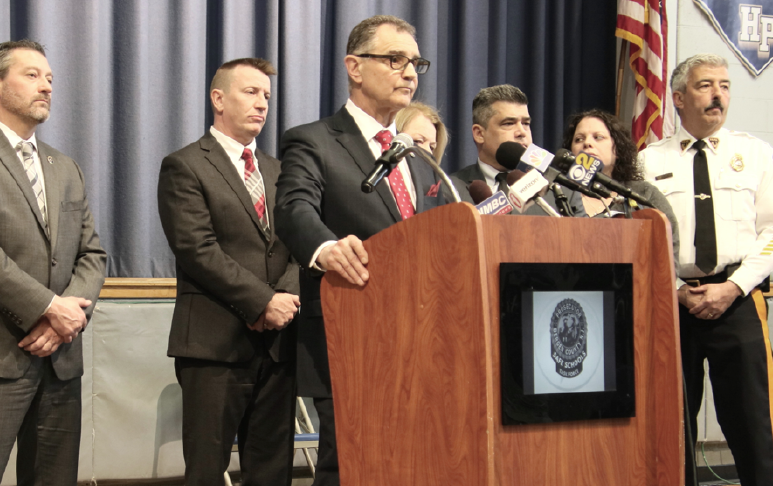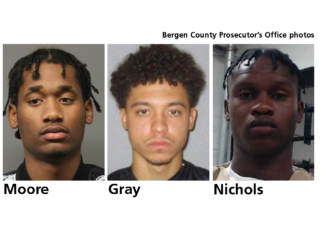
BERGEN COUNTY, N.J.—An interagency task force composed of educators, law enforcement officers, and mental health professionals strongly recommends new training programs on mental health for students and parents, more use of an anonymous mobile tip reporting app for teens and adding mental health “care teams” in every school to identify and help at-risk teens, said Bergen County Prosecutor’s Office officials.
The report by the Prosecutor’s Office Safe Schools Task Force is its second annual report detailing school security progress and recommendations for 2020.
Formed in April 2018 following the Parkland, Fla., high school shooting, the task force consists of five committees charged with reviewing “best practices” and providing suggestions for school safety and security.
Its first report was issued in March 2019 and focused on suggestions and best practices to prevent school violence and make schools safe.
The new report emphasizes immediate needs and lays out the group’s progress since last March. It notes that three training sessions offered—covering active-shooter response, mental health and building security—have trained more than 4,500 education professionals, support staff, and law enforcement officers.
It notes active-shooter response training was recently expanded to county libraries, which regularly provide activities for and host school children.
The task force conducted risk vulnerability audits in 25 school facilities and visited 18 school districts to review “lock down” procedures in 31 separate buildings, said the report.
‘Many have not’ trained
The report points out though many districts have signed up for free training sessions offered by task force professionals, “many have not. We continue to strongly suggest that all school districts avail themselves of these trainings for their personnel.”
Over the last year, the mental health committee provided mental health training to 1,337 school personnel in 63 schools.
Moreover, task force members strongly pushed for creation of “assessment care teams” at schools and offered training on how to establish such teams, including team leadership and make-up.
Such so-called ACT teams include the principal, a mental health professional, and trained school safety personnel.
The committee suggests close interaction between the ACT team and other intervention and referral services “to identify students struggling with personal, mental health, emotional, substance abuse, and other issues.”
Another 2020 goal is to have “greater interaction” with a county superintendents’ association to seek the group’s input.
App non-use ‘unacceptable’
During an interview with Robert Anzilotti, Prosecutor’s Office chief of detectives, and Supervising Senior Assistant Prosecutor Martin Delaney, both officials said the lack of implementing an anonymous tip reporting system via the LiveSafe app, which was highlighted in its first report, was “unacceptable” and was a top task force priority for 2020.
Both said area superintendents appeared to have privacy concerns and saw use of the app as “more burdensome” to them due to districts needing to investigate false or inaccurate tips and wasting time and resources.
Both officials said districts are required by law to set up an anonymous reporting system to provide for input from students and parents, and most have failed to do so.
“There’s not a single district that’s embraced this (LiveSafe) app,” said Anzilotti on March 4.
“Frustration is an understatement. Hopefully parents will understand the importance of this and want it,” he added.
He said despite the Prosecutor’s Office “answering a lot of concerns” about the app from superintendents, LiveSafe has not been downloaded by many students or parents.
Bad behaviors not reported
Anzilotti said a U.S. Secret Service in-depth study of 41 school shootings released in November 2019 found that an anonymous tip reporting app could help provide information to authorities in advance of an attack. Oftentimes, the study found, students committing attacks had a history of disciplinary trouble and bad behavior that was concerning to others, but these behaviors were almost never reported.
The report notes that LifeSafe app tips would be categorized into areas such as facility security, threatening behavior and suspicious activity. Tips texted via the app can then be directed by BCPO staff receiving them to school officials, law enforcement.
LiveSafe ‘an effective tool’
“LiveSafe (app) reduces barriers to communication that typically prevent the sharing of such vital information. (It) eliminates student reluctance by providing an effective and anonymous way to share information. Importantly, information is not limited to threats of serious violence. LiveSafe can be an effective tool for reporting acts of bullying, illegal drug use or activity, or students in need of intervention or counseling,” says the report.
The report calls on “all school administrators to ensure that all employees and students download LiveSafe and train on its use and functions” and requests that all local police chiefs “insist” all school safety plans include an anonymous 24/7 tip reporting tool.
Training students, parents
One of the training committee’s new goals is to expand its programs on school safety, prevention of violence, and proper responses to school violence to include students and parents.
In 2019, 3,000-plus educators and school staff attended such trainings. New student training programs being conducted in 2020 are age-appropriate for middle school and high school students, says the report, and stress the importance of school lockdown and emergency activation plans.
New parent training sessions will focus on parents’ role in creating an effective school safety plan, and schools are encouraged to involve parents, especially with regard to their role in moderating the emotional impacts of lockdown drills on kids.
Recent studies have indicated elementary school students suffer short- and long-term stress from lockdown drills, including post-traumatic stress and anxiety.
The report notes during lockdowns “students often contact one or both parents by cellphone, text or instant message. Understandably, frightened parents call their local police department, which is already overwhelmed with its emergency response… Frightened and frustrated parents then respond to the school,” which causes traffic tie-ups for emergency responders and diverts law enforcement attention away from the threat due to parents’ arrival on-scene, says the report.
‘Designated location’
The committee recommends every school safety plan determine a “designated location” for parents to congregate at during an emergency, such as a library or municipal building. The training states that police and school officials be present there to update parents on the situation.
The group’s legislative and policy committee plans to work with the mental health committee in 2020 to recommend Bergen County schools embrace the “Yellow Ribbon Schools” program that highlights schools that demonstrate excellence in mental health training, education and support.
They also advocate for “mental health assessments as part of school medical screenings”—a recommendation highlighted by chair and Freeholder Mary Amoroso in a prior Pascack Press article.
As part of this, they recommend “mandated psychological counselors and (mental health) assessment care teams in every school.”
Other recommended actions include amending fire alarm regulations that send students into common hallways during an active-shooter situation; funding for digital mapping of schools and school security enhancements; a review of “red flag” extreme risk protective orders to reduce gun violence; and development of a state-wide school security checklist.
The biggest takeaway, Delaney said, was the new report’s call to implement an anonymous reporting app for students, parents and educators.
“The benefits of having an anonymous reporting system like LiveSafe far outweigh any downsides,” he said in an interview.
Last November, the Prosecutor’s Office announced its Intelligence Unit would be available 24/7 to take texts via the LiveSafe mobile app, evaluate the tips and generate timely follow-up responses from law enforcement and school authorities.
Anonymous app urged
However, despite LiveSafe’s underwhelming rollout so far, Delaney said the BCPO would continue urging districts to adopt the mobile app.
On weekends, Delaney previously noted all anonymous tips would be routed to trained emergency dispatchers at the county dispatch center for immediate follow-up.
“If your district chooses not to use LiveSafe, what are they using to capture tips and ‘red flags’ that students, teachers and parents are picking up on” but not reporting, questioned Delaney. Although the report does not address funding resources, a state education department spokesman said funding guidelines for about $100 million in school security dollars under 2018’s Securing Our Children’s Future $500 million Bond Act are due in April.


